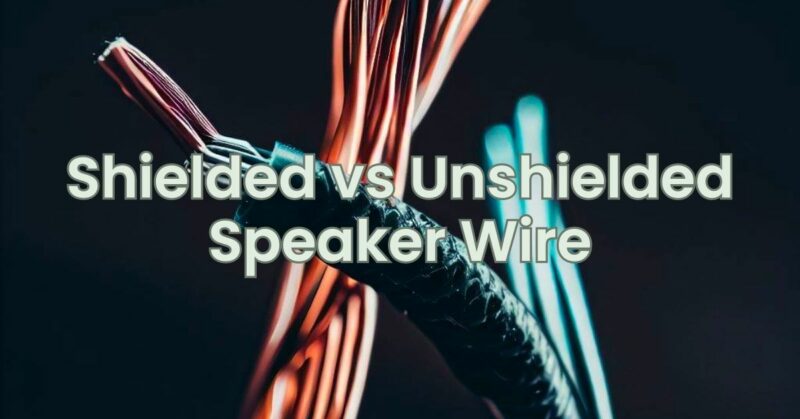When choosing speaker wire, one of the most important decisions you’ll make is whether to go with shielded or unshielded. Both types of wire have their own advantages and disadvantages, so it’s important to understand the differences before making a decision.
Shielded Speaker Wire
Shielded speaker wire has a metal layer that surrounds the conductors. This layer of metal helps to block interference from external sources, such as electrical noise and radio waves. Shielded wire is a good choice if you live in an area with a lot of electrical noise, or if you plan on running your speaker wires near power lines.
Unshielded Speaker Wire
Unshielded speaker wire does not have a metal layer. This makes it less expensive than shielded wire, but it also makes it more susceptible to interference. Unshielded wire is a good choice if you live in an area with low levels of electrical noise, or if you plan on running your speaker wires away from power lines.
Which Type of Speaker Wire Should You Choose?
The best type of speaker wire for you will depend on your individual needs and circumstances. If you live in an area with a lot of electrical noise, or if you plan on running your speaker wires near power lines, then shielded wire is the best choice. If you live in an area with low levels of electrical noise, or if you plan on running your speaker wires away from power lines, then unshielded wire is a good option.
Here is a table that compares the pros and cons of shielded and unshielded speaker wire:
| Feature | Shielded Speaker Wire | Unshielded Speaker Wire |
|---|---|---|
| Price | More expensive | Less expensive |
| Interference Protection | Better | Worse |
| Installation Flexibility | Less flexible | More flexible |
| Sound Quality | Can be better in some cases | Can be better in some cases |
Ultimately, the best way to decide which type of speaker wire is right for you is to experiment. Try both types of wire and see which one you prefer.
Additional Tips for Choosing Speaker Wire
Here are a few additional tips for choosing speaker wire:
- Choose the right gauge. The gauge of speaker wire refers to the thickness of the wire. The thicker the wire, the more current it can carry. If you are using a powerful amplifier, you will need to use thicker speaker wire.
- Choose the right length. The length of speaker wire will depend on the distance between your amplifier and your speakers. If you are running long speaker wires, you may want to use a thicker gauge of wire to reduce resistance.
- Choose the right connectors. The connectors that you use to connect your speaker wire to your amplifier or receiver will depend on the type of connectors that your amplifier or receiver has. Make sure to choose connectors that are compatible with your equipment.
In conclusion, shielded speaker wire is designed to provide protection against electromagnetic and radio frequency interference, making it an excellent choice for environments with high electrical noise levels or longer cable runs. Unshielded speaker wire, on the other hand, offers a cost-effective solution for most residential applications with minimal interference concerns. By evaluating your specific environment, cable length, budget, and future needs, you can make an informed decision about whether shielded or unshielded speaker wire is the right fit for your audio system.


